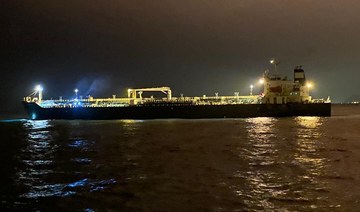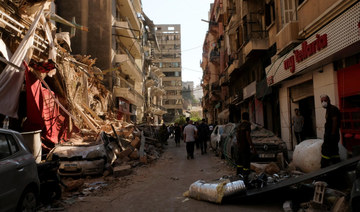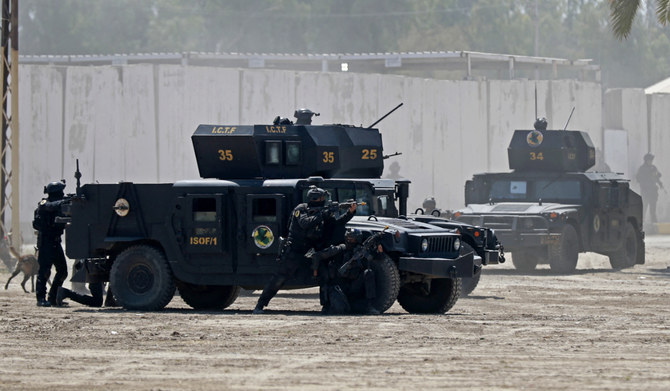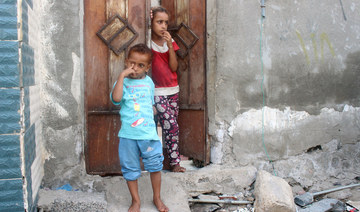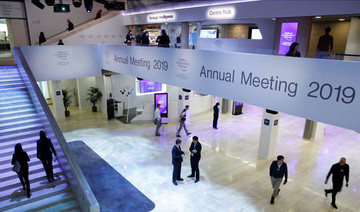VIENNA: US Secretary of State Mike Pompeo on Friday urged an extension to a UN arms embargo on Iran, saying it would be “nuts” to let it expire.
Opposition from UN Security Council veto powers China and Russia is expected to block a resolution to extend the blockade beyond October.
Pompeo reiterated during a visit to Vienna that Iran should not be allowed to buy and sell weapons, calling the Islamic Republic “the world’s largest state sponsor of terrorism.”
“I mean that’s just nuts... We’re urging the whole world to join us” to extend the arms embargo, he said.
As things stand arms sanctions are set to be eased gradually from October, under a Security Council resolution blessing a 2015 deal Iran signed with world powers to limit its ability to develop a nuclear bomb — in exchange for easing trade barriers.
The landmark deal has come under strain since the US pulled out of it in 2018.
As Washington has re-imposed crippling sanctions, Tehran has in turn stepped up its nuclear activities again since last year.
Pompeo urged Tehran to provide “full, transparent and immediate cooperation” with the International Atomic Energy Agency (IAEA), which monitors Iran’s compliance with the nuclear deal.
After meeting Pompeo on Friday, IAEA Director General Rafael Grossi told reporters that Iran had still not granted the agency access to two sites where it has requested access in order to clarify questions about possible undeclared nuclear activity in the early 2000s.
But he added that he had “hope” continued dialogue would get Iran to open up.
“My objective is to get this access,” Grossi said.
Citing a restricted IAEA report, Bloomberg News reported Thursday that Iran was transferring advanced centrifuges used to enrich uranium from a pilot facility into a new hall at its main Natanz nuclear fuel plant, which was hit by a fire last month.
Grossi said he would not comment on restricted reports from the agency, adding Iran had informed the IAEA of “what has been going on” in Natanz and it was part of inspectors’ “ongoing work.”
Austria is the latest stop on a Central European tour that has taken Pompeo to the Czech Republic and Slovenia. He will continue on to Poland on Saturday.
In Slovenia he signed a declaration that the EU member will “exclude untrusted vendors” from 5G networks, part of the Trump administration’s campaign to persuade allies to exclude Chinese telecoms giant Huawei.
Austria has so far declined to exclude any vendor outright.
Friday’s visit was a rare bilateral trip to Austria for a US foreign minister, although Vienna and Washington both say they value their close ties.
Austrian Chancellor Sebastian Kurz, who Pompeo will meet later Friday, visited the White House last year.
The under-construction Nord Stream 2 pipeline designed to bring Russian gas to Western Europe is a bone of contention between the two governments, with Austria’s OMV one of the energy industry players involved.
Pompeo says letting Iran arms embargo expire is ‘nuts’
https://arab.news/528gt
Pompeo says letting Iran arms embargo expire is ‘nuts’
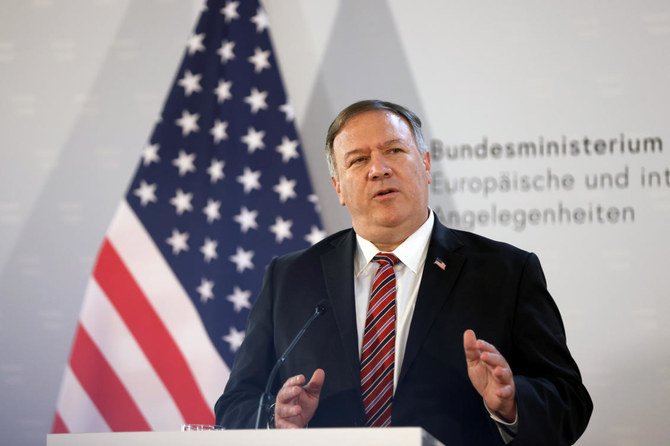
- Pompeo reiterated that Iran should not be allowed to buy and sell weapons
- He called the Islamic Republic “the world’s largest state sponsor of terrorism”
Leaders of Jordan and Pakistan call UAE president to express concern about effects of severe storm

- Leaders passed on their best wishes to the country as it recovers from the storms
DUBAI: The president of the UAE, Sheikh Mohammed bin Zayed Al-Nahyan, received telephone calls from King Abdullah of Jordan and Pakistan’s Prime Minister Shehbaz Sharif on Friday, during which they expressed concern about the effects of the severe weather, including unusually heavy rainfall, that battered parts of the country this week.
They also passed on their best wishes to the country as it recovers from the storms and “conveyed their heartfelt hopes for the safety and prosperity of the UAE and its people, praying for their protection from any harm,” the Emirates News Agency reported.
Sheikh Mohammed thanked both leaders for their warm sentiments, and emphasized the strong bonds between the UAE and their nations.
The UAE and neighboring Oman were hit by unprecedented rainfall and flooding on Tuesday, with more than 250 millimeters of rain falling in parts of the Emirates, considerably more than is normally seen in a year. Dubai International Airport was forced to close temporarily when runways were flooded.
Peshmerga fighter dies in Turkish strike in north Iraq

JEDDAH: A member of the Kurdish Peshmerga security forces was killed on Friday in a Turkish drone strike in the autonomous Kurdistan region of northern Iraq.
Ankara regularly carries out ground and air operations in the region against positions of the outlawed PKK, the Kurdish separatist group that has waged a decades-long insurgency against the Turkish state.
The victim of Friday’s attack died in a drone strike on his vehicle, said Ihsan Chalabi, mayor of the mountainous Sidakan district near Iraq’s borders with Turkiye and Iran.
For decades, Turkiye has operated several dozen military bases in northern Iraq in its war against the PKK, which Ankara and its Western allies consider a terrorist group.
Both Baghdad and the Kurdish regional government have been accused of tolerating Turkiye’s military activities to preserve their close economic ties.
At the beginning of April, a man described as “high-ranking military official” from the PKK was killed in a Turkish drone strike on a car in the mountainous Sinjar region, according to the Kurdistan counterterrorism services.
Turkish President Recep Tayyip Erdogan is expected to visit Baghdad on Monday on his first official visit to Iraq since 2011.
Iraq’s Defense Minister Thabet Al-Abassi in March ruled out joint military operations against the PKK, but said that Turkiye and Iraq would “work to set up a joint intelligence coordination center.”
Middle East in ‘shadow of uncertainty due to regional conflicts’

WASHINGTON: Economies in the Middle East and North Africa face a “shadow of uncertainty” from ongoing tensions in the region, a senior IMF official said.
“We are in a context where the overall outlook is cast into shadows,” Jihad Azour, the International Monetary Fund’s director for the Middle East and Central Asia department, said in an interview in Washington.
“The shadow of uncertainty on the geopolitical side is an important one,” added Azour, a recent candidate for the next Lebanese president.
In the face of the ongoing conflicts in Gaza and Sudan and a recent cut to oil supplies by Gulf countries, the IMF has pared back its growth outlook for the Middle East and North Africa region once again.
FASTFACT
Economic activity in Gaza has ‘come to a standstill’ and the IMF estimates that economic output in the West Bank and Gaza contracted by six percent last year.
The IMF expects growth in MENA of 2.7 percent this year — 0.2 percentage points below its January forecast — before picking up again next year, the IMF said in its regional economic outlook report.
The risks to growth in the MENA region remain heightened, the IMF said, pointing to the danger of greater regional spillovers from the ongoing Israel-Gaza war.
“We have concerns about the immediate and lasting impact of conflict,” Azour said.
The IMF report said that economic activity in Gaza has “come to a standstill” and estimates that economic output in the West Bank and Gaza contracted by 6 percent last year.
The IMF said the report excludes economic projections for the West Bank and Gaza for the next five years “on account of the unusually high degree of uncertainty.”
The IMF cannot lend to the West Bank and Gaza because they are not IMF member countries.
However, Azour said it has provided the Palestinian Authority and the central bank with technical assistance during the current conflict.
“When we move into the reconstruction phase, we will be part of the international community support to the region,” he added.
Azour also discussed the situation in Sudan, where thousands have been killed in a civil war that has also devastated the economy, causing it to contract by almost 20 percent last year, according to the IMF.
“The country is barely functioning, institutions have been dismantled,” he said.
“And for an economy, for a country like Sudan, with all this potential, it’s important to stop the bleeding very quickly and move to a phase of reconstruction,” he added.
The recent Houthi attacks have particularly badly hit the Egyptian economy on Red Sea shipping, which caused trade through the Egypt-run Suez Canal to more than halve — depriving the country of a key source of foreign exchange.
Egypt reached an agreement last month to increase an existing IMF loan package from $3 billion to $8 billion after its central bank hiked interest rates and allowed the pound to plunge by nearly 40 percent.
A key pillar of the current IMF program is the privatization of Egypt’s state-owned enterprises, many of which are owned by or linked to the military.
“This is a priority for Egypt,” Azour said. Egypt needs to have a growing private sector and give space for the private sector to create more jobs.”
“We have an opportunity to re-engineer the state’s role, to give the state more responsibility as an enabler and less as a competitor,” he said.
Oxfam director urges global support for refugees in Jordan
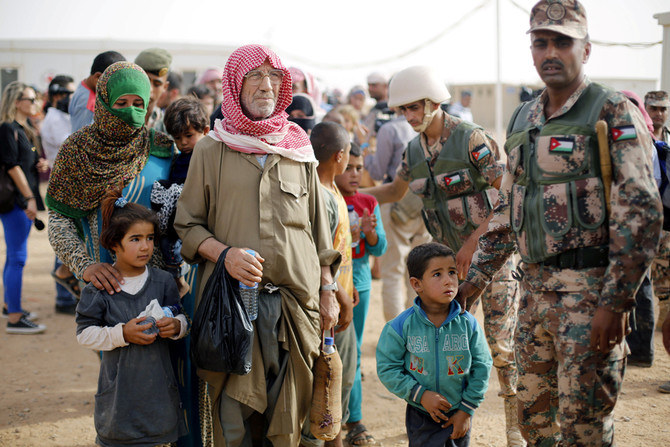
- Dmitry Medlev speaks of impact of over 3m people from neighboring areas
LONDON: Oxfam’s country director in Jordan said on Friday the global community had a responsibility to support refugees, especially in light of unrest in the Middle East.
In an interview with the Jordan News Agency, Dmitry Medlev described how an influx of over 3 million refugees from neighboring areas had stretched Jordan’s economic resources, disrupted local communities, and burdened public services.
He described the refugee’s experience as harrowing, often involving the painful process of abandoning the individual’s homeland and everything they held dear.
He said: “We are sending a message to the world not to overlook the refugee problem and to keep its focus on the new global disasters created by humans or caused by natural disasters, and the conflicts that have emerged in several countries recently, because the refugee problem is draining host countries and imposing additional burdens on them that they may not be able to bear in the future.”
Medlev called for enhanced international cooperation and adherence to international humanitarian law in supporting refugees, underscoring the need for long-term solutions to the ongoing crisis.
He also spoke of Oxfam’s initiatives in Jordan, such as the Waste to Positive Energy project in partnership with the Federal Ministry of Economic Cooperation and Development, and the EU, and executed with the German Corporation for International Cooperation. The project focuses on waste management and recycling in Zaatari Camp and Mafraq Governorate, processing about 30 tonnes of waste per day.
Medlev also pointed out Oxfam’s efforts in promoting economic and climate justice through grants aimed at empowering local projects led by women and youngsters. These grants help enhance project efficiency, ensure sustainability, and connect beneficiaries with supportive institutions.
He outlined Oxfam’s five-year strategy in Jordan, which focuses on gender justice, climate justice, and economic justice, and aims to bolster the country’s preparedness for disasters, enhance employment opportunities, and provide humanitarian support for refugees.
Jordan’s King Abdullah II told the UN General Assembly in September that the world must not abandon Palestinian refugees to the forces of despair.



